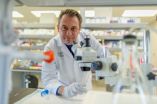(Press-News.org) Babies suffering from life-threatening bacterial infections such as sepsis could benefit from improved treatment, thanks to a ground-breaking study.
For the first time, researchers have been able to detect and decode a signal generated from a baby's DNA that can tell doctors whether or not a bacterial infection is present in the bloodstream.
The findings could help develop a test for bacterial infection in newborns, using a single drop of blood.
Immediate detection of such infections, which are a major cause of death among young children, is currently impossible as no simple test exists.
Accurate diagnosis of infection could limit overuse of antibiotics, which can lead to drug resistance.
The University of Edinburgh team has identified a signal consisting of 52 molecular characters – like a biological tweet – that is specific to bacterial infection.
The researchers, who have spent the past decade trying to unravel the complexities of blood poisoning and its treatment among premature and full-term babies, say that the genome's signal provides critical, immediate information on the infection.
Using blood samples from newborn babies in Edinburgh, the study investigated thousands of signals written in biological code known as messenger RNAs.
Through meticulous code-breaking the scientists were able to decipher with close to 100 per cent accuracy the signals generated by an infant's genome that specifically tell that they are suffering from sepsis.
Diagnosing sepsis in newborns is extremely difficult, as signs of infection, such as a high temperature, may not occur – or if they do, they may not be due to an infection.
Currently the most reliable way to detect infection is by detecting the bacteria in the blood but this requires a relatively large volume of blood.
An antibody test cannot be used as it only provides historical information about an infant's illness.
Professor Peter Ghazal, Professor of Molecular Genetics and Biomedicine at the University of Edinburgh's Division of Pathway Medicine, explained: "Just as a Twitter user can send a 140 character message so a baby's genome produces short messages or signals that produce code information to communicate with the infant's immune and metabolic systems so that it can fight the infection. The 52-character 'tweet' or message that we have identified appears to be specific for bacterial but not viral infection. This type of signal could also be used to detect infection in children and adults. We are now working on ways of using a single drop of blood to detect this vital signal. This work is also leading us onto a response to tackling antibiotics resistance."
Dr Claire Smith, Consultant Neonatologist at the Simpson Centre for Reproductive Health, Royal Infirmary of Edinburgh, added: "This study has the potential to provide real clinical benefits in the future. Despite advances in neonatal care, infection in newborn babies remains a significant issue. Infection is responsible for a significant proportion of neonatal deaths worldwide, and also increases the risk of long-term disability in survivors. There is a pressing clinical need for more accurate and rapid testing for neonatal infection than is currently available. This work is enabling us to move towards being able to distinguish between babies with true infection who need urgent treatment, and those who are not infected and therefore don't require antibiotics. The potential benefits to babies and their families are important. We are grateful to the families who consented to take part in the study."
INFORMATION:
The paper, which is published in Nature Communications, was supported by the Wellcome Trust, the Chief Scientist Office, EU-FP7, the Biotechnology and Biological Sciences Research Council, Engineering and Physical Sciences Research Council and the Medical Research Council.
For more information please contact Eleanor Cowie, Press & PR Officer, on tel; +44 131 650 6382 / 0131 242 +44 7794 058 467
Newborns' genetic code sends infection distress signal
Babies suffering from life-threatening bacterial infections such as sepsis could benefit from improved treatment, thanks to a groundbreaking study
2014-08-14
ELSE PRESS RELEASES FROM THIS DATE:
Bypass commands from the brain to legs through a computer
2014-08-14
VIDEO:
The right arm muscles and the locomotion center of the man are artificially connected through a computer. His legs are in a relaxed state. When he moves his right hand,...
Click here for more information.
Gait disturbance in individuals with spinal cord injury is attributed to the interruption of neural pathways from brain to the spinal locomotor center, whereas neural circuits locate below and above the lesion maintain most of their functions. An artificial connection ...
Aspirin may slow recurrence in breast cancer patients
2014-08-14
SAN ANTONIO (August 14, 2014) — New findings published today in the journal Cancer Research reveal that some postmenopausal overweight breast cancer patients who use common anti-inflammatory drugs like aspirin or ibuprofen have significantly lower breast cancer recurrence rates.
Researchers from the Cancer Therapy & Research Center at The University of Texas Health Science Center at San Antonio and the University of Texas at Austin began by examining blood serum from CTRC breast cancer patients, said CTRC oncologist Andrew Brenner, M.D., Ph.D.
Studying Blood Serum
They ...
Protein found to block benefits of vitamin A cancer therapy
2014-08-14
Retinoic acid is a form of vitamin A that is used to treat and help prevent the recurrence of a variety of cancers, but for some patients the drug is not effective. The reason for this resistance was unclear until this week when researchers from Virginia Commonwealth University (VCU) Massey Cancer Center demonstrated that a protein known as AEG-1 blocks the effects of retinoic acid in leukemia and liver cancer. Because AEG-1 is overexpressed in nearly every cancer, these findings could impact the care of countless cancer patients.
Details of the study were published ...
Lionfish characteristics make them more 'terminator' than predator
2014-08-14
SACRAMENTO, Calif. – New research on the predatory nature of red lionfish, the invasive Pacific Ocean species that is decimating native fish populations in parts of the Caribbean Sea and Atlantic Ocean, seems to indicate that lionfish are not just a predator, but more like the "terminator" of movie fame.
The finding of behavior that was called "alarming" was presented today by Kurt Ingeman, a researcher from Oregon State University, at the annual meeting of the Ecological Society of America.
Most native predatory fish are attracted to prey when their numbers are high, ...
NSAIDs may lower breast cancer recurrence rate in overweight and obese women
2014-08-14
PHILADELPHIA — Recurrence of hormone-related breast cancer was cut by half in overweight and obese women who regularly used aspirin or other nonsteroidal anti-inflammatory drugs (NSAIDs), according to data published in Cancer Research, a journal of the American Association for Cancer Research.
"Our studies suggest that limiting inflammatory signaling may be an effective, less toxic approach to altering the cancer-promoting effects of obesity and improving patient response to hormone therapy," said Linda A. deGraffenried, PhD, associate professor of nutritional sciences ...
Mayo Clinic challenges some recommendations in updated cholesterol treatment guideline
2014-08-14
A Mayo Clinic task force challenges some recommendations in the updated guideline for cholesterol treatment unveiled by the American College of Cardiology (ACC) and American Heart Association (AHA) in 2013. The task force concludes, based on current evidence, that not all patients encouraged to take cholesterol-lowering medications, such as statins, may benefit from them and that the guideline missed some important conditions that might benefit from medication.
Furthermore, the task force believes an emphasis needs to be placed on an individualized treatment approach ...
NSAIDs benefit overweight breast cancer patients, study finds
2014-08-14
AUSTIN, Texas — Researchers have determined that postmenopausal overweight or obese breast cancer patients receiving hormone therapy as part of their treatment and who use nonsteroidal anti-inflammatory drugs (NSAIDs) such as aspirin or ibuprofen have significantly lower breast cancer recurrence rates and a sizable delay in time to cancer recurrence.
The findings, published in the Aug. 14 edition of Cancer Research, suggest a new possibility for reducing the incidence of breast cancer recurrence among overweight and obese postmenopausal women, who have a comparatively ...
Scientists make major breakthrough in understanding leukemia
2014-08-14
Scientists from Queen Mary University of London (QMUL) have discovered mutations in genes that lead to childhood leukaemia of the acute lymphoblastic type – the most common childhood cancer in the world.
The study was conducted amongst children with Down's syndrome – who are 20-50 times more prone to childhood leukaemias than other children – and involved analysing the DNA sequence of patients at different stages of leukaemia.
The researchers uncovered that two key genes (called RAS and JAK) can mutate to turn normal blood cells into cancer cells. However, these ...
Can our computers continue to get smaller and more powerful?
2014-08-13
From their origins in the 1940s as sequestered, room-sized machines designed for military and scientific use, computers have made a rapid march into the mainstream, radically transforming industry, commerce, entertainment and governance while shrinking to become ubiquitous handheld portals to the world.
This progress has been driven by the industry's ability to continually innovate techniques for packing increasing amounts of computational circuitry into smaller and denser microchips. But with miniature computer processors now containing millions of closely-packed transistor ...
UT Arlington team's work could lead to earlier diagnosis, treatment of mental diseases
2014-08-13
A computer science and engineering associate professor and her doctoral student graduate are using a genetic computer network inference model that eventually could predict whether a person will suffer from bipolar disorder, schizophrenia or another mental illness.
The findings are detailed in the paper "Inference of SNP-Gene Regulatory Networks by Integrating Gene Expressions and Genetic Perturbations," which was published in the June edition of Biomed Research International. The principal investigators were Jean Gao, an associate professor of computer science and engineering, ...
LAST 30 PRESS RELEASES:
Striking genomic architecture discovered in embryonic reproductive cells before they start developing into sperm and eggs
Screening improves early detection of colorectal cancer
New data on spontaneous coronary artery dissection (SCAD) – a common cause of heart attacks in younger women
How root growth is stimulated by nitrate: Researchers decipher signalling chain
Scientists reveal our best- and worst-case scenarios for a warming Antarctica
Cleaner fish show intelligence typical of mammals
AABNet and partners launch landmark guide on the conservation of African livestock genetic resources and sustainable breeding strategies
Produce hydrogen and oxygen simultaneously from a single atom! Achieve carbon neutrality with an 'All-in-one' single-atom water electrolysis catalyst
Sleep loss linked to higher atrial fibrillation risk in working-age adults
Visible light-driven deracemization of α-aryl ketones synergistically catalyzed by thiophenols and chiral phosphoric acid
Most AI bots lack basic safety disclosures, study finds
How competitive gaming on discord fosters social connections
CU Anschutz School of Medicine receives best ranking in NIH funding in 20 years
Mayo Clinic opens patient information office in Cayman Islands
Phonon lasers unlock ultrabroadband acoustic frequency combs
Babies with an increased likelihood of autism may struggle to settle into deep, restorative sleep, according to a new study from the University of East Anglia.
National Reactor Innovation Center opens Molten Salt Thermophysical Examination Capability at INL
International Progressive MS Alliance awards €6.9 million to three studies researching therapies to address common symptoms of progressive MS
Can your soil’s color predict its health?
Biochar nanomaterials could transform medicine, energy, and climate solutions
Turning waste into power: scientists convert discarded phone batteries and industrial lignin into high-performance sodium battery materials
PhD student maps mysterious upper atmosphere of Uranus for the first time
Idaho National Laboratory to accelerate nuclear energy deployment with NVIDIA AI through the Genesis Mission
Blood test could help guide treatment decisions in germ cell tumors
New ‘scimitar-crested’ Spinosaurus species discovered in the central Sahara
“Cyborg” pancreatic organoids can monitor the maturation of islet cells
Technique to extract concepts from AI models can help steer and monitor model outputs
Study clarifies the cancer genome in domestic cats
Crested Spinosaurus fossil was aquatic, but lived 1,000 kilometers from the Tethys Sea
MULTI-evolve: Rapid evolution of complex multi-mutant proteins
[Press-News.org] Newborns' genetic code sends infection distress signalBabies suffering from life-threatening bacterial infections such as sepsis could benefit from improved treatment, thanks to a groundbreaking study





